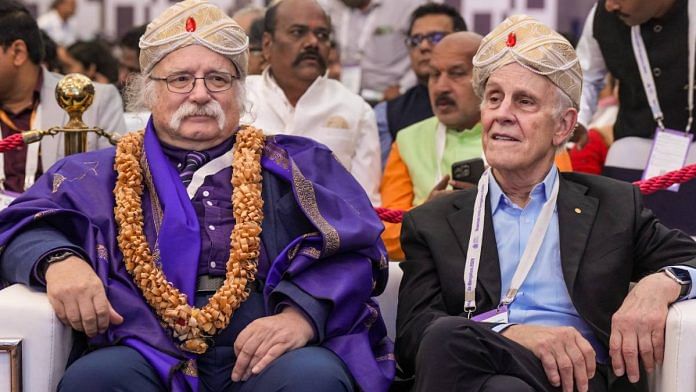New Delhi: India should work to sustain basic research infrastructure to keep brain drain at bay and investing in fundamental science is important to develop deep technology like quantum computing, Nobel laureates in physics, Prof Duncan Haldane (2016) and Prof David Gross (2004), advised at Quantum India Bengaluru summit Thursday.
“Young people, if they are really talented, they are not going to stay here if they do not have the scientific opportunities,” Gross, an American theoretical physicist, said in response to a query by ThePrint.
The two-day summit focuses on the theme ‘Building a Quantum Ecosystem: Qubits to Society’.
Focus on fundamental research is important to understand quantum technology. For instance, the answer to the fundamental question of how quantum mechanics and gravity sit together in physics is still unknown. Exploring such fundamental questions is important with the right amount of infrastructure for basic research. You have to make it more attractive for the Indian diaspora to come back, said Haldane.
Gross, who is also the chair of International Advisory Board at the Bengaluru-based International Centre for Theoretical Sciences, went on to criticise India’s lack of investment in R&D, while Haldane said it can’t just be the government, and that industries should also actively invest in technology and research.
In 2009, India’s Research & Development (R&D) spending was 0.84 percent of its GDP, according to government data. This fell to 0.64 percent of GDP in 2021.
“India’s GDP has increased, but its relative contribution to investment in the future that will drive these new technologies, new industries, is falling behind,” said Gross.
India last year launched Anusandhan National Research Foundation, aiming to provide strategic direction for research, innovation and entrepreneurship in various scientific fields and grow a culture of research throughout India’s universities. This year, the Centre has announced allocation of Rs 1,425 crore to support scientific research through its Vigyan Dhara scheme by establishing laboratories for basic research.
“Investing in real science to develop quantum devices, new materials is expensive. (It) does not occur simply by copying technologies from outside the country,” Gross added.
“I’ve been coming to Karnataka for 20 years or more, and it’s a great improvement everywhere. But relatively speaking, you have an incredible population of brilliant young kids who aren’t receiving adequate education,” he said.
Gross further said he had hoped that India would surpass China in research and technology but was disappointed.
“I’m enormously impressed by the young Indian talent. Some of our best colleagues in the US are Indian students, post-docs, and colleagues. (But) not that impressed with the Indian government and its commitment to developing true scientific and technological power,” he added.
(Edited by Nida Fatima Siddiqui)
Also Read: Karnataka quantum summit: 1000+ teachers to be made ‘quantum-ready’, says minister Boseraju




